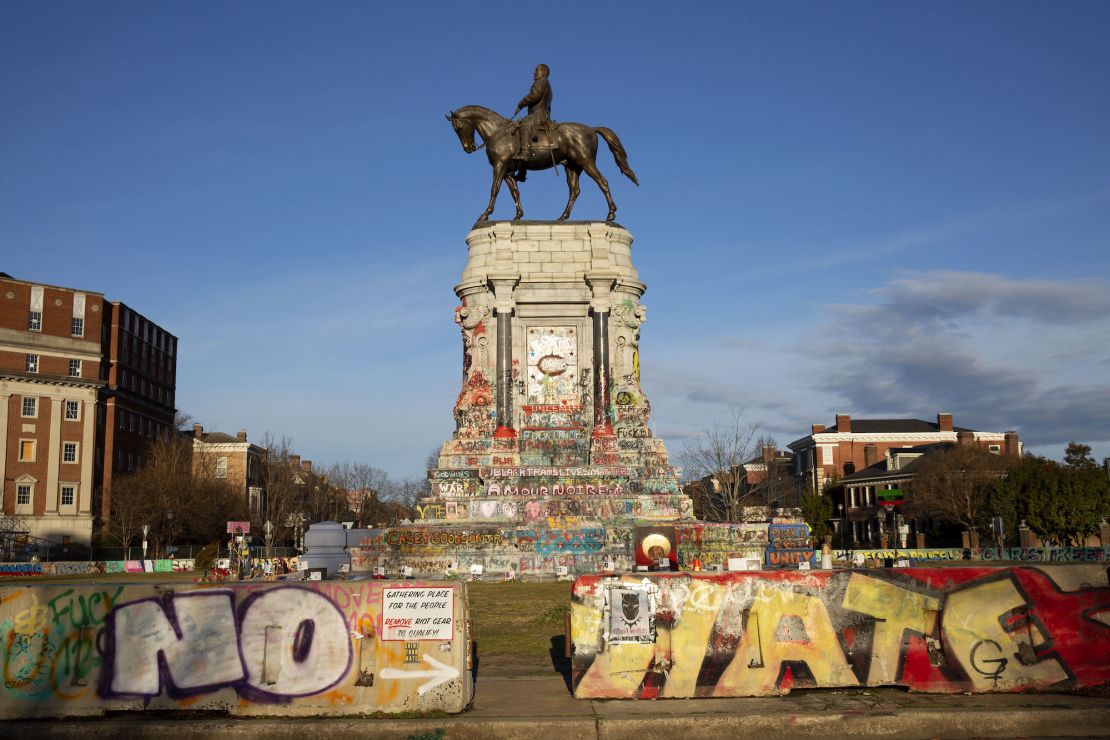Editor’s Note: Nicole Hemmer is an associate professor of history and director of the Carolyn T. and Robert M. Rogers Center for the Study of the Presidency at Vanderbilt University. She is the author of?“Partisans: The Conservative Revolutionaries Who Remade American Politics in the 1990s”?and co-hosts the podcasts?“Past Present”?and?“This Day in Esoteric Political History.” The views expressed in this commentary are her own. View?more?opinion?on CNN.
In 2020, Virginia’s Shenandoah County School Board joined hundreds of other institutions across the country when it renamed two schools to shed their association with Confederate leaders and enslavers. Stonewall Jackson High School became Mountain View, and Ashby Lee Elementary School (named after Confederate generals Turner Ashby and Robert E. Lee) became Honey Run.

Late last week, the school district became the first in?the nation?to?reverse?such name changes.
School board members voting for the change said they did so because the initial?name changewas part of a “knee-jerk reaction” to the 2020 protests.?One board member said?the members who voted to drop the Confederate names had “exploited the tragedy of?Covid” in order to push through the decision without full public input.
The rollback of the reckoning with America’s racist past and present has proceeded with alarming speed in recent years. Corporations?have slashed?their funding for diversity and inclusion initiatives, and Republican state governments?have forced universities?to downsize or eliminate their diversity and inclusion offices. Books by Black authors?have been banned?in dozens of schools, and teachers in some districts?have been barred?from mentioning structural racism.
In light of these policies, this re-renaming of two schools may not seem like much. But in restoring the Confederate names, the school board has signaled that the politics of?redemption?have fully returned, and that no part of the reckoning of the last decade will go unchallenged.
Honoring Jackson and Lee is an act of Confederate nostalgia wherever it happens. In Virginia, though, the political valence of the act is especially sharp. Stonewall Jackson High School?opened in 1959?as a White-only school, in defiance of the Supreme Court’s Brown v. Board of Education ruling five years earlier that segregated schools were unconstitutional. In the wake of Brown, which celebrates its 70th anniversary this week, school boards throughout Virginia regularly opted?to close schools altogetherrather than open them to Black students. Slapping Jackson’s name on the White-only school sent a clear message about who the school was for, even after the first Black students?enrolled several years later.
Twenty-five years later, when the federal government?established Martin Luther King, Jr. Day, White Virginians again turned to Jackson — and to Lee.?Instead?of?honoring King with a stand-alone holiday (the state?had commemorated?King on New Year’s Day since 1978), the state assembly bundled him with Lee and Jackson,?who had been given a joint state holiday since 1904. Thus Lee-Jackson-King Day, the most incongruous holiday in the United States, was born.
The irony of grouping a Black civil rights leader with two Confederate enslavers became too heavy to bear by 2000, when the state separated the holidays. In 2020, after several municipalities?stopped marking the holiday, the state assembly?dropped?Lee-Jackson Day altogether.
The memory of Lee and Jackson likewise played?a significant role in recent efforts to promote (and to violently resist) racial reconciliation in Virginia. Statues of both men stood in the middle of two city parks in downtown Charlottesville, Virginia since the 1920s, when White townspeople, backed by the Ku Klux Klan, erected the monuments as?part of a terror campaign?against the city’s Black citizens.
The year before Shenandoah County opened Stonewall Jackson High School in 1959, Virginia’s governor ordered two Charlottesville schools to close?rather than desegregate. They reopened under court order in February 1959, though?nearly a third?of the schools’ White students left for segregated private schools.
Nearly a century?after the Confederate statues went up in Charlottesville,?in response to?a petition?drawn up by then-15-year-old Zyahna Bryant, the Charlottesville City Council?voted in February 2017 to remove the statues of Lee and Jackson and rename the parks. Robert E. Lee Park became Emancipation Park; Stonewall Jackson Park became Justice Park.
What happened next was an orgy of racism and violence that stunned most Americans. Neo-Nazis, neo-Confederates and Klan members marched on the city several times in the ensuing months, culminating in the racist rally that began with a torchlight attack on antiracist activists at the University of Virginia and ended with a car attack that murdered Heather Heyer and injured a score of other antiracist protesters. That violence, combined with a series of lawsuits, kept the statues in place?until 2021, when the Supreme Court ruled that a state law prohibiting the removal of war memorials did not apply to the Charlottesville statues. Late last year, the Lee statue?was taken to a foundry and melted down.

The battle over the name of the parks and the fate of the statues in Charlottesville were deeply intwined with policy debates over fair housing, equal access to education and income inequality. What could be dismissed as symbolic politics was actually deeply rooted in a broader policy vision. That’s because these markers on the landscape reflect the vision for the people and the polity that a community wants to pursue.
That was true in 1924, when the statues were erected in a display of White power; true in 2017 when the parks were renamed for emancipation and justice; true in 2018 when a cowed City Council?renamed the parks again, this time to be as anodyne as possible (the parks are now called Market Street and Court Square).
A few years later in Richmond, Virginia, the city’s Robert E. Lee statue became?a site of protest and reclamation. Following the police murder of George Floyd in Minneapolis, protesters gathered at the Lee statue and transformed it into a symbol of resistance, tagging it with slogans calling for equal rights, justice and accountability for the police.
At night, they projected images of Floyd and leaders of the Black freedom struggle onto the monument. Finally, the statue came down,?relocated?to the Black History Museum and Cultural Center of Virginia.
Get our free weekly newsletter
- Sign up for CNN Opinion’s newsletter.
- Join us on Twitter and Facebook
We minimize all this change at our peril. Names matter, because they signal who we honor and how we imagine our communities. They tell us something about the people who hold power at the local level and how they plan to use it.
The Shenandoah County School Board knows this; it’s why they have reclaimed the names of Jackson and Lee. They have chosen to christen the schools to the Confederacy, to revive the celebration of enslavement and insurrection and White supremacy that have always been central to any act that honors the Confederate generals. In doing so, they have provided a stark reminder that the process of racist redemption is well under way in the United States, and steadily gaining in power and confidence.


